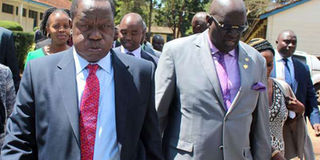Thousands miss out on varsities over poor KCSE performance

Education Cabinet Secretary Fred Matiang'i (left) and Kenya National Examinations Council Chairman George Magoha arrive at Nairobi School on December 20, 2017 to release 2017 Kenya Certificate of Secondary Education test results. Performance in the KCSE exam remained almost unchanged this year and in 2016. PHOTO | DENNIS ONSONGO | NATION MEDIA GROUP
What you need to know:
- For the second year running, private universities and colleges have been thrown into a crisis for lack of students.
- Knec Chairman George Magoha defended the results, saying due process was followed as marking of the scripts was done with due diligence.
Hundreds of thousands of this year’s Form Four leavers have been locked out of universities and other tertiary institutions.
The Kenya Certificate of Secondary Education (KCSE) test results released on Wednesday by Education Cabinet Secretary Fred Matiang’i indicate that only 70,073 out of the 611,952 candidates — just 11.5 per cent — managed the minimum university entry qualification of mean grade C+.
In 2016, some 88,929 qualified.
And, for the second year running, private universities and colleges have been thrown into a crisis for lack of students.
The more than 70 universities have a capacity of over 100,000.
UNIVERSITIES
Performance in the KCSE exam remained almost unchanged this year and in 2016.
There were 142 (0.02 per cent) candidates who obtained an overall mean grade A in the 2017 exam compared to 141 (0.02 per cent) last year.
Last year, Kenya Universities and Colleges Central Placement Service (KUCCPS) placed 71,089 students in public universities while 17,368 joined private universities.
Most of the more than 31 public universities that have been relying on parallel students will once again go back to the drawing board.
Parallel students pay more fees compared to regular ones, which the universities use to fund their development activities.
TEACHERS' UNIONS
Private universities, which have also invested heavily in a bid to enhance capacity, will once again miss students.
Kenya Union of Post-Primary Education Teachers (Kuppet) Secretary-General Akelo Misori dismissed the results, saying Dr Matiang’i’s focus was to deny private universities and colleges students.
The unionist said teachers’ colleges and Kenya Medical Training Colleges will not get students, adding that the CS was more focused on administration of national examinations than its credibility.
Kenya National Union of Teachers (Knut) Secretary-General Wilson Sossion echoed Mr Misori’s sentiments.
ENROLMENT
Public universities have spent massive resources, most of it borrowed, to set up hundreds of satellite campuses to cater for the demand for higher education, which has been surging every year with thousands registering, especially for evening classes.
However, several universities have closed down a number of satellite campuses for lack of students.
The institutions have also hired hundreds of part-time lecturers to teach Module 2 programmes.
This means thousands of lecturers and other workers will lose their jobs as the institutions lay off staff.
JOBS
Only 142 candidates scored A, 2,714 A-, 7,344 B+, 12,628 B, 19,385 B- and 27,860 C+. These are the ones who will go to university.
The candidates with C totalled 40,474 as 61,040 scored C-, 88,447 D+, 135,550 D, 179,381 D- and 35,536 E.
This means that more than half of the candidates scored D and below and cannot pursue any professional courses.
They cannot also join the security forces or the teaching profession.
To join the security forces, D+ is the minimum grade while those who want to be P1 teachers must have scored C plain, or D+ for early childhood development education (ECDE) tutors.
EXAM MARKING
The low scorers will have to scramble for limited vocational training slots.
Last year, 141 candidates scored A, 4,645 had A-, 10,975 B+, 17,216 B, 23,745 B-, 32,207 C+, 44,792 C, 61,026 C-, 80,951 D+, 112,135 D, 149,929 D- and 33,399 E.
Dr Matiang’i raised his concerns over poor performance in the examination but assured Kenyans that the tough measures that he introduced to fight cheating will be sustained.
Kenya National Examinations Council (Knec) Chairman George Magoha defended the results, saying due process was followed as marking of the scripts was done with due diligence.
Prof Magoha said marking was done in 25 centres in Nairobi so that Knec could monitor them on a daily basis.
Education Principal Secretary Belio Kipsang proclaimed: “Our biggest investment has been in ICT.”





